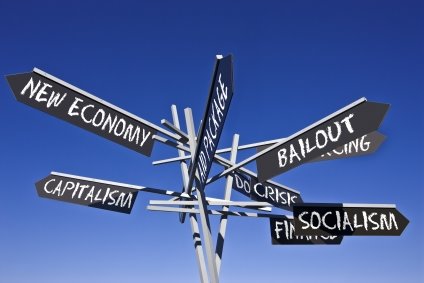
In a previous post we discussed the giving pattern of the early church, it was seen that those who had more sold their possessions, and the money was distributed to those who had less (cf. Acts 2:45-56; 4:32-35; 6:1). This is the true biblical model of “redistributing the wealth.” But notice what is not involved anywhere in this redistribution: the government.
Wealth Redistribution: Great Idea. Bad Practice
Redistribution of wealth is a wonderful idea, is commended by God, and we find numerous examples of it within the pages of Scripture. But wealth redistribution is not something that can be commanded, required, or legislated. You cannot create laws which are enforced by the government to take money from the rich and give it to the poor. This has never worked in the history of the world, and never will. Why? Because if the rich want to remain rich, then threating to take their riches will only cause them to hide it better, or find other ways to become even more rich than before.
Furthermore, not all the poor deserve the aid that is offered. There are some who could and should be working, but since they are getting free handouts from the government, they refuse to work, or even to look for a job. When the rich see their money going to people who could be providing for themselves but aren’t, they are usually not too happy about the money they give, and they definitely don’t want to give more.
The Problem with Wealth Redistribution
The great problem with governments and economic systems that are built upon the wealthy supporting the poor is that they masquerade as being the biblical model, the form of taking care of the poor that was practiced by Jesus and in the early church. But nothing could be further from the truth.
 Communism, som, and every government-run economic plan to redistribute the wealth functions on the principle of taking money from the rich and giving it to the poor. The government often serves as the mediator in this transaction by taxing the rich, and then running the money through a vast array of bureaucracies until eventually, a small portion of what was given finally makes it to the nameless masses of poor people, many of whom do not even need the aid, are taking advantage of the system, or could otherwise work but choose not to. This process is full of waste, fraud, and abuse, and the wealthy feel like the government is stealing from them, and the poor are not helped in the long term, but only become ever more dependent upon the government.
Communism, som, and every government-run economic plan to redistribute the wealth functions on the principle of taking money from the rich and giving it to the poor. The government often serves as the mediator in this transaction by taxing the rich, and then running the money through a vast array of bureaucracies until eventually, a small portion of what was given finally makes it to the nameless masses of poor people, many of whom do not even need the aid, are taking advantage of the system, or could otherwise work but choose not to. This process is full of waste, fraud, and abuse, and the wealthy feel like the government is stealing from them, and the poor are not helped in the long term, but only become ever more dependent upon the government.
Biblical Wealth Redistribution
 The biblical model, the model practiced by Jesus and by the early church in Acts was very different. There truly was redistribution of wealth, but it did not depend on a government agency to step in and take money from the poor. It did not depend on threats and taxation. The money that was given did not get lost in the leaky accounts and broken cogs of government bureaucracy. The money from the rich did not go to the underserving and the lazy. It actually went to help people who had genuine needs, and it actually helped them rise above their situation so that they no longer needed help, and most amazingly of all, the wealthy never felt cheated, robbed, or taken advantage of.
The biblical model, the model practiced by Jesus and by the early church in Acts was very different. There truly was redistribution of wealth, but it did not depend on a government agency to step in and take money from the poor. It did not depend on threats and taxation. The money that was given did not get lost in the leaky accounts and broken cogs of government bureaucracy. The money from the rich did not go to the underserving and the lazy. It actually went to help people who had genuine needs, and it actually helped them rise above their situation so that they no longer needed help, and most amazingly of all, the wealthy never felt cheated, robbed, or taken advantage of.
What was this system of wealth redistribution? It was called generosity. The current governmental systems encourage the poor to say, “What is yours is mine.” But the biblical example taught the rich to say, “What is mine is yours.” The rich were encouraged and challenged to give as much as they could as often as they could to help those less fortunate, or to help those who faced difficult life situations.
There are numerous factors that make some people rich. Sometimes money is inherited, and frequently, becoming wealthy is a matter of luck, and being in the right place at the right time. But it is usually also true that those who are rich have learned to make wise decisions with their money. And they do not appreciate being forced to give their income to people who make poor decisions with money. But many rich people love to use some of their money to help other people, especially when it goes for a good cause, or to help people out of a bad situation, or even to provide life skills and job training that will lift other people out of their current situation.
 But this sort of generosity on the part of the rich often requires personal involvement and the development of relationships between the rich and the poor. And since the two groups of people usually live and function in completely different circles, it is difficult to bring the two groups together. But this is one area where churches are unusually effective.
But this sort of generosity on the part of the rich often requires personal involvement and the development of relationships between the rich and the poor. And since the two groups of people usually live and function in completely different circles, it is difficult to bring the two groups together. But this is one area where churches are unusually effective.
With some intentional planning and organization, churches can create spaces and times where the rich can help the poor, and the poor can bless the rich. The church can be the great equalizer, and develop places and where the rich and the poor can develop mutually beneficial relationships, for the good of all.
This post is part of the Februrary Synchroblog. A list of the other Synchroblog participants will be provided below:
- Marta Layton – Fear Leads to Anger. Anger Leads to hate …
- Kathy Escobar – Pawn Shops, Empty Refrigerators, The Long Hill Up
- Carol Kuniholm – Wondering About Wealth
- Glenn Hager – Shrinking The Gap
- Liz Dyer – The First Step Is Admitting There Is A Problem
- Ellen Haroutunian – Economic Inequality: Coming Back To Our Senses




This is one of our ongoing topics in the United Church of Christ. We often find ourselves in a dilemma…..do we continue to advocate for more equitable economic policies, while we realize that there ARE those who would refuse to work? This points back to original sin like nothing else does. The sin of those who would ignore the poor, as well as the sin of those who would freeload off the backs of working people.
David,
It is a major dilemma for all of us.
Meanwhile, I think that should continue to pay our full taxes as required by the government, and then still take as much money as we can afford, and do with it what we can to take care of others.
You are absolutely right that it all points back to sin.
Are you against government funded assistance programs?
No, our denomination (If I’m correct) tends to favor those programs.
Sorry I wasn’t clear. I was directing the question to Jeremy.
Liz,
No. Yes. No. Yes.
I suppose it depends which programs you are talking about, on which day you ask me, and which person we are talking about.
I know people who are on government assistance, getting free schooling, free healthcare, etc, but who have enough money to buy 100 pairs of shoes, name brand clothing, own an iPhone, and buy a Mercedes. How can this be?
Are there people who need it? Absolutely. Are there people who get assistance, and really don’t need it? Absolutely.
So…my answer is Yes and No.
Agreed.
Yes, “wealth distribution” by governments and sometimes by organizations amount to little more than a handout. Those not in need as well as the truly needy get in line for the freebies.
“personal involvement and the development of relationships between the rich and the poor” works best. Even giving our money or goods to “Christian” organizations can be iffy at best. Often, only a small portion is distributed to the needy, while the remainder goes for offices and equipment, salaries, vehicles, plane fares, and so on for the workers.
Sam,
More than anyone else, I respect you and your opinion on this, because I know you are doing these things personally. I am trying to step out in small ways in my own area, but you have been doing these things for years, and have much practical experience. Thank you for being an inspiration and a guide.
I wish I lived closer to you!
Jeremy, you can say lots of negative things about government wealth redistribution schemes, indeed you have said quite a lot, but this one is not accurate.
For at least the last 60 years most western European governments, including my own British one, have practised a mildly sot form of wealth redistribution, by taxing the rich and providing benefits to the poor. Of course the rich complain. Certainly some who benefit are not genuinely poor. Indeed it is all rather bureaucratic. But it works! It has provided economic prosperity and political stability in western Europe throughout this period, in a society which is much less polarised between rich and poor than the USA.
I’m not arguing here that this kind of society is right and just, far less that it is the biblical pattern – although I could point to Joseph’s anti-famine measures in Egypt as a parallel. I am making a simple and purely pragmatic point, that government sponsored redistribution of wealth can work.
I should point out that the first line of my previous comment was supposed to stand out as a <blockquote>. There must be some defect in this much hyped Standard Theme in not distinguishing blockquotes in comments.
Peter,
Yes, I am pretty certain it will not work. Generosity cannot be legislated either.
Ultimately, the problem is with the human heart.
On the other hand, looking at the mess in Europe right now due to all the government-run programs (and the US is not far behind), I am not sure it is working as well as you say.
Good response. The U.S. is doing the same thing as Europe, we have 70 million people living on government aid. It just isn’t sustainable but most people don’t have a choice right now. We need to ween people off of government aid but with the state of the economy it is difficult to find a way to do this!
Here are my thoughts after reading this. A bit off topic, but just some things that popped into my head that I’ve been thinking about lately.
The rich try to act like the government is taking all of their money, but the fact of the matter is that most rich people pay less taxes proportionally than poor people do
The problem is that rich people are cheating the system and trampling on the poor. Corporations aren’t paying enough in taxes (or in cases such as G.E. ZERO taxes) , and continue to pay lower and lower wages to workers, while giving the most bonuses in history to their executives. They complain about the regulations but there really aren’t very many (and the ones that do exist have too many loopholes). Don’t even get me started on these mythical “job creators”. And to those employees that are getting by, as soon as they hit make any money they are fired to make way for new entry level people who will work for half the pay.
The middle-class and poor are being walked all over by the greedy of this country.
And to those who say the poor should just “work harder” or get better jobs, nobody can find a freaking job right now. The actual unemployment is hovering around 16 percent.
At some point we have to ask, can we allow things to continue as they are? SOME government intervention is necessary.
P.S. – Nothing will ever change as long as we allow the lobbyists and corporations to control both political parties.
/end rant
one more thing I forgot to mention….
The middle-class and the poor bailed out wall street and the banks….now THAT was wealth redistribution.
where was our bailout? We bailed out the banks, who will never be able to pay back the taxpayers, and now they won’t even give people loans.
It just isn’t right. Our entire system is rigged.
Kirk,
Great points all.
Yes, in many ways the system is rigged. I don’t know what the answers are. I do know that the problem is sin and greed. But you can’t rid of these by laws.
We do need certain laws though. The tax code needs to change and corporations need more regulation. We need term limits for our congress (10% approval rating as of today!)
If we fix the corruption in our system, if only a little bit, things might actually turn around.
Eventually we will realise that comparisons are odious and as your said Jeremy it’s all to do with the heart. It does depend whether you believe that everyone will receive justice at the end of their life. Wealth and power are a trap for the foolish who I believe will get what they deserve. What we plant we will reap.
It’s not my or anybody else’s problem that people will always be dishonest and happy to see the poor and the disenfranchised remain as they are so they can remain on the top of the pile. It is my responsibility however to do whatever I can to change things by getting involved locally directly and internationally indirectly through petitions etc. I can only be responsible for me and it is not in my remit to force anyone to behave in a manner that I might approve of.
I vote in local and national elections I write letters of encouragement and objections and pray that what I feel should be done to alleviate the struggles of the poor etc will happen. You can make people do what you want, but I want them to have a heart change as I am not happy that some will go to eternal damnation because of their greed and lies.
However if you don’t believe in God then you can’t believe in His justice either. I would much prefer to be a Lazarus sat outside the rich mans house for my earthly life than in torment for eternity.
I am called to bring as many people to Jesus as possible, but the responsibility and choice to follow is theirs. The poor and rich, young and old will be in both heaven and hell. Your destination is not decided by your wealth or power but by your heart. I do not envy the reach or decry the poor. You and I have to just do the best with what we have been given and follow the ways of Jesus as best we can. May I not be found wanting when my time comes to give account of my life to Him who gave it to me in the first place.
Clive
All great points, Clive! Thank you very much!
Awesome, clear, and concise! I couldn’t agree more. Thanks, Jeremy.
Awesome. Finally someone who gets it! Genorosity not the same as wealth redistribution. Thank you for this. And to the one who wrote som is working in Europe: it is now 4 years later and Europe is in shambles. Governments going under and the people are worse off. Don’t think it worked. Giving from the heart will be the only thing that will ever have long term effects and repeat givers.
You can’t realistically curb the power of billionaires and fairly distribute wealth without the State involved. Wealth is taken by the State in taxes, not by the Church.